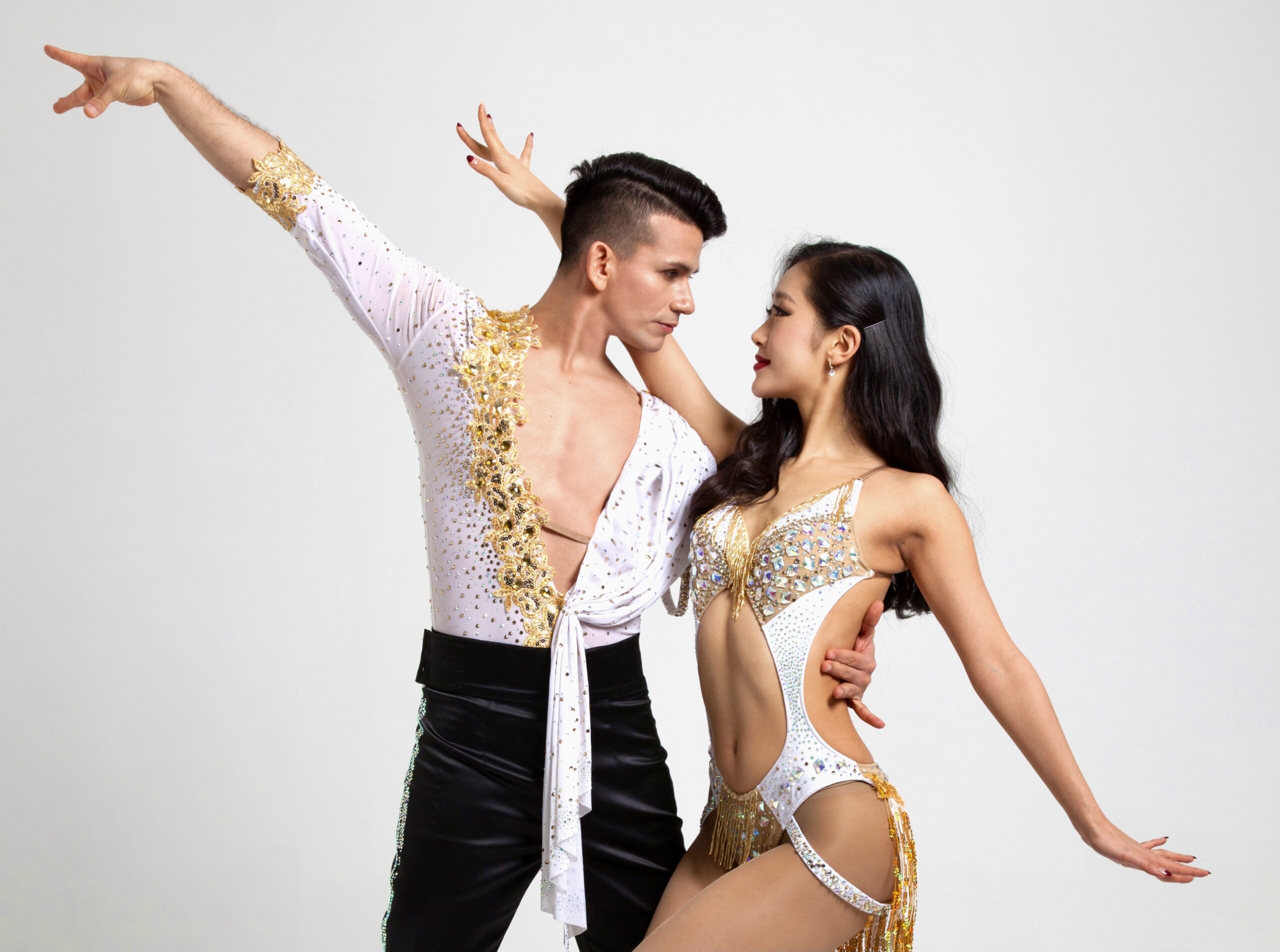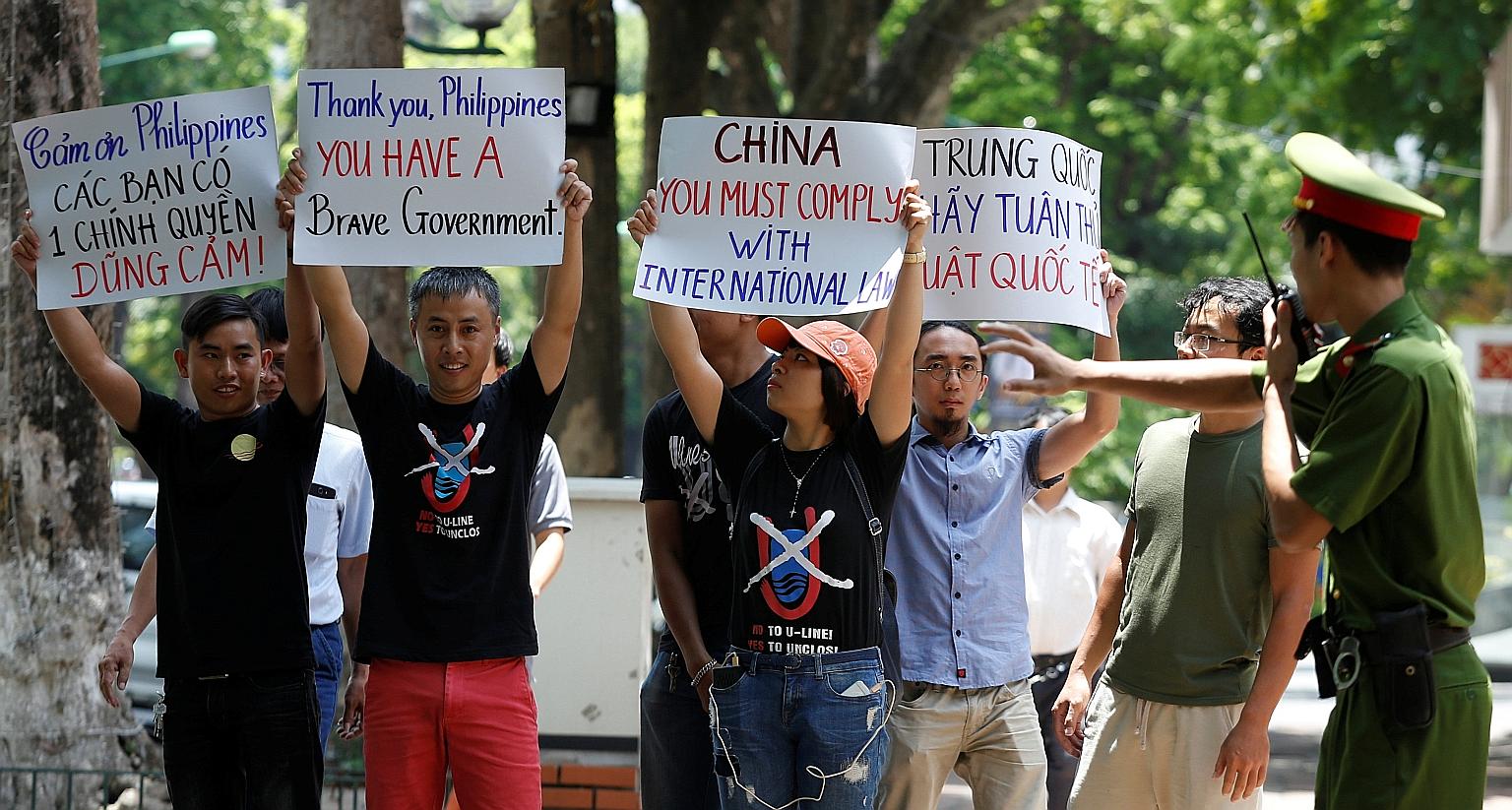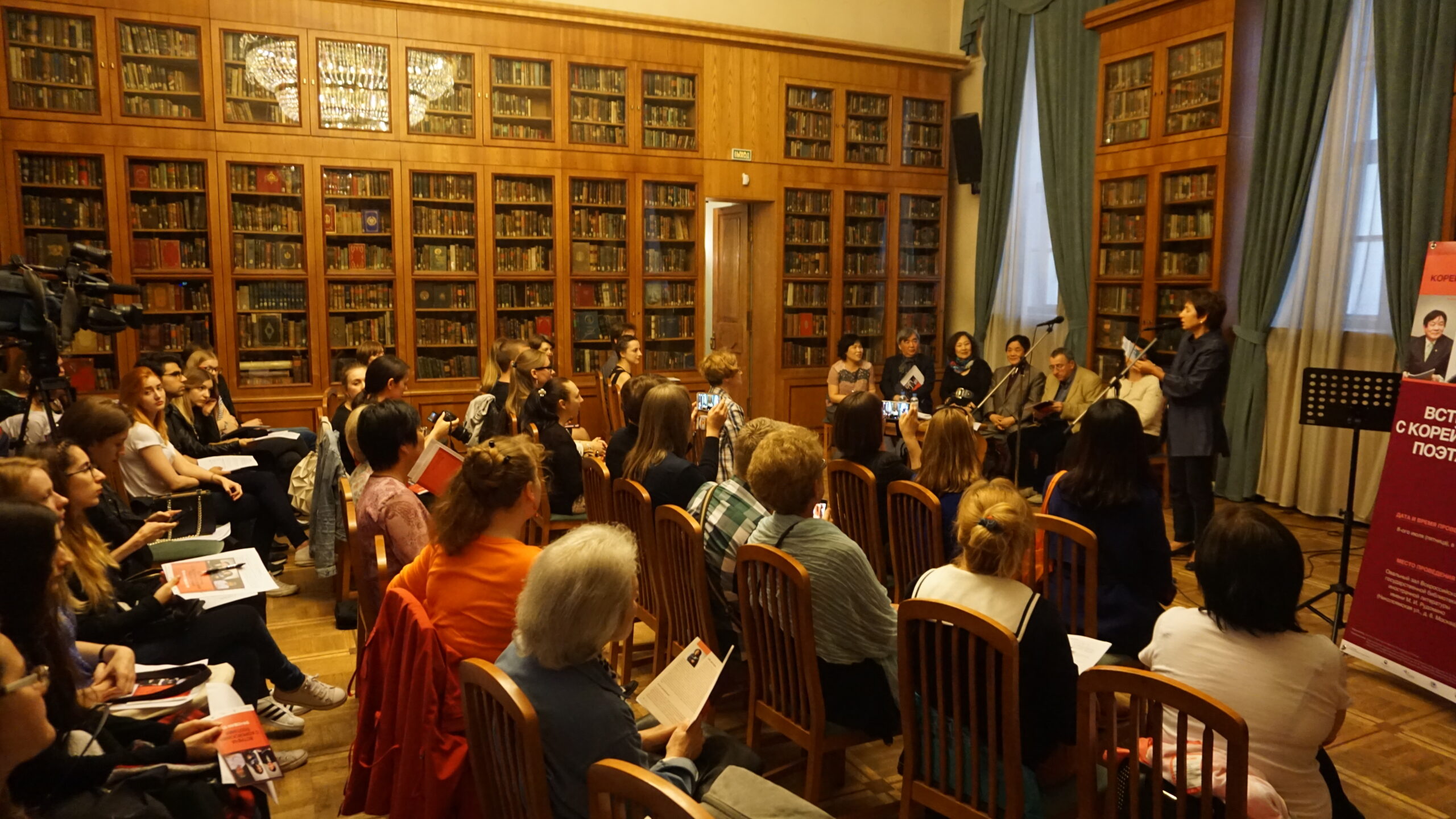El Amor for Latin Dance in South Korea
Time away from home, as one of South Korea’s overwhelming winters engulfed my tropical soul, it left me in languish and pining for change. Weary from strained romances, toxic insecurity of my self-worth, and a pursuit for pure childlike bliss led me to explore dance as a medium of cathartic expression. South Korea has been a mecca of numerous dance styles from hip hop, b-boying to contemporary, ballet, and more; each are taught by eminent experts. Yet, I was inclined towards choosing a partner-based art form over solo performances because I subconsciously yearned to pursue a dance that could help me spark a momentary connection with my dance partners. I needed a dance form that valued the vibe and intimacy we could share on the dancefloor over superficial perfection and showcase of technique.
Serendipity led me to Latin dances. I enrolled for Bachata & Salsa classes with Jhonathan Dance Company (JDC) for I believed learning with them would provide me the skill and freedom to express my emotions in a raw, unadulterated form through elegant movements. Since then, Latin culture has been working its magic on me!
Jhonathan Dance Company (JDC)_Seoul
JDC is one of the most popular dance schools that is synonymous with Latin dances in Korea. The founder of JDC, Jhonathan Jimenez, cast the vision of sharing his Colombian roots and his family legacy of Latin dance with South Korea. His grandfather, father, and his family devoted their entire lives to learning and perfecting Latin dance forms, which eventually shaped Jhonathan’s purpose and goals. He has travelled across countries to perfect diverse dance forms like, tango from Argentina, samba from Brazil, salsa from Cuba, bachata from Dominican Republic, and so on. JDC initially began in Los Angeles, USA and is now expanding in South Korea as a part of Jhonathan’s dream to spread the love of Latin culture worldwide.
His protégé and representative of JDC Korea, Jane Sung, whose passion for dance superseded the status quo of a traditional 9-6 job, now has been associated with JDC for over 5 years and has mastered numerous Latin dance forms under Jhonathan’s able tutelage. Jane had always shared a creative side and had been a talented hip-hop dancer, leading a popular crew in her school days. Disillusioned with monotony from her mundane work life and a quest for deeper meaning and purpose, led Jane to pursue Latin dances at JDC, where she found her true calling. Passion, rigorous practice post work hours, and the dedication to imbibe this art in its pure traditional form has culminated her into an elegant dancer of everyone’s envy today.
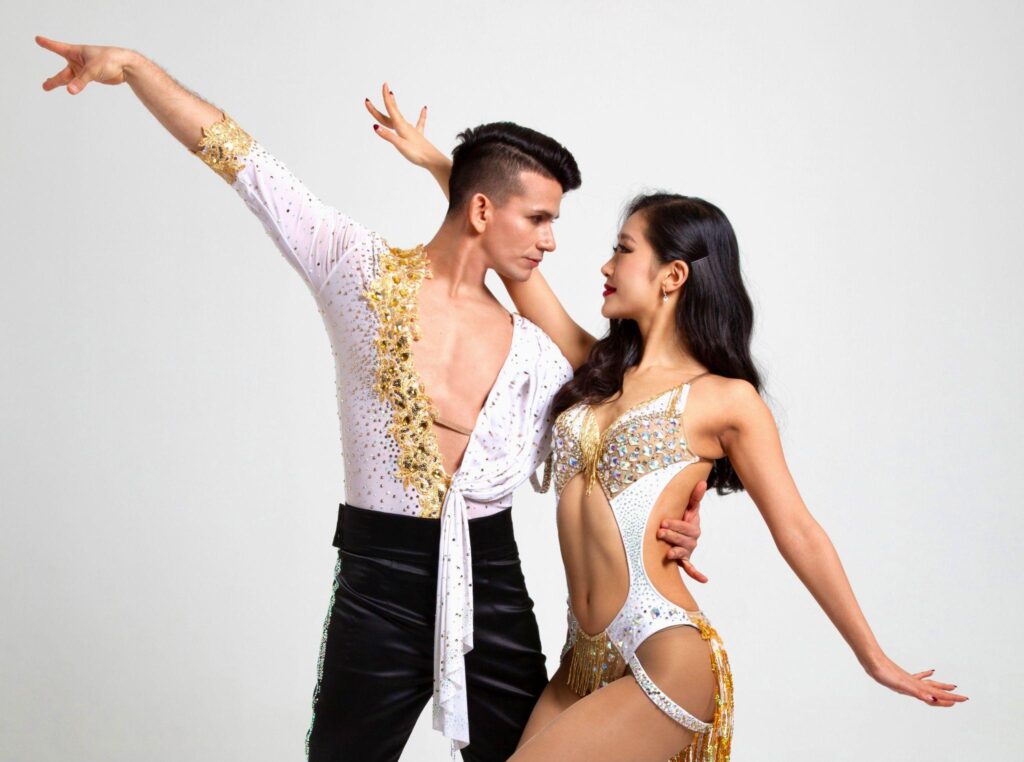
Jonathan & Jane. Source: Jonathan Dance Company (JDC)
Together at JDC, they dedicate their time in teaching students from around the world, with diverse racial and ethnic backgrounds in an inclusive and welcoming environment. With the philosophy of dancing for happiness and love, they are striving towards achieving three key visions in the near future:
1) Accessibility for all to learn Latin dance forms through JDC classes and to have an opportunity in experiencing the bliss of Latin culture, by the medium of subsidised or free classes for people stemming from the lower-economic strata.
2) Educate the South Korean society and dance aficionados of the true purpose of Latin dances, which lie in the basic fundamentals rather than the glorified showcase of technique. Emphasis on sharing the love and joy of dance over competition and perfection.
3) Share the precious legacy of Latin dance forms with the world by training and recruiting professional teachers dedicated to the philosophy of JDC. Establishing numerous JDC dance schools worldwide.
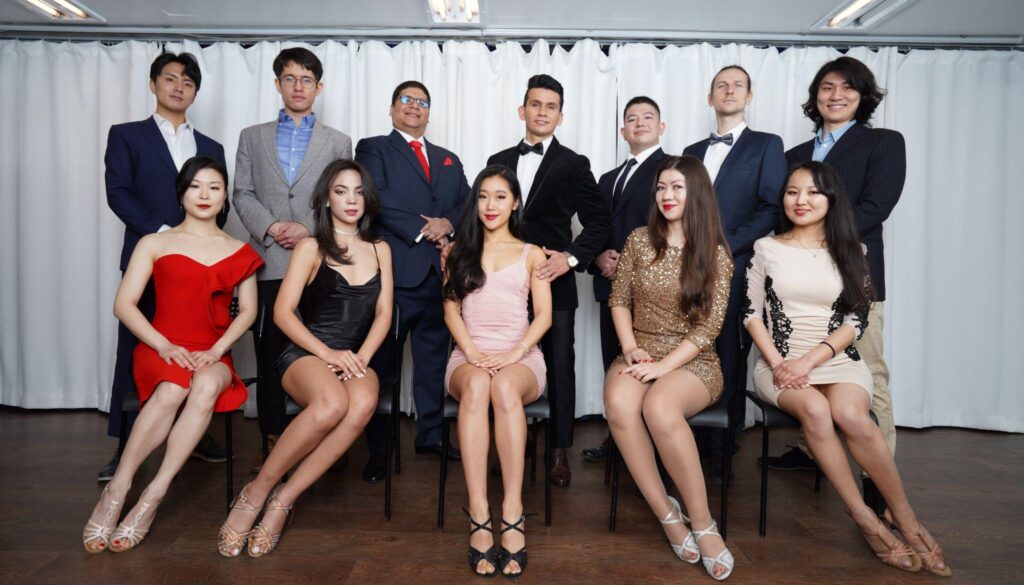
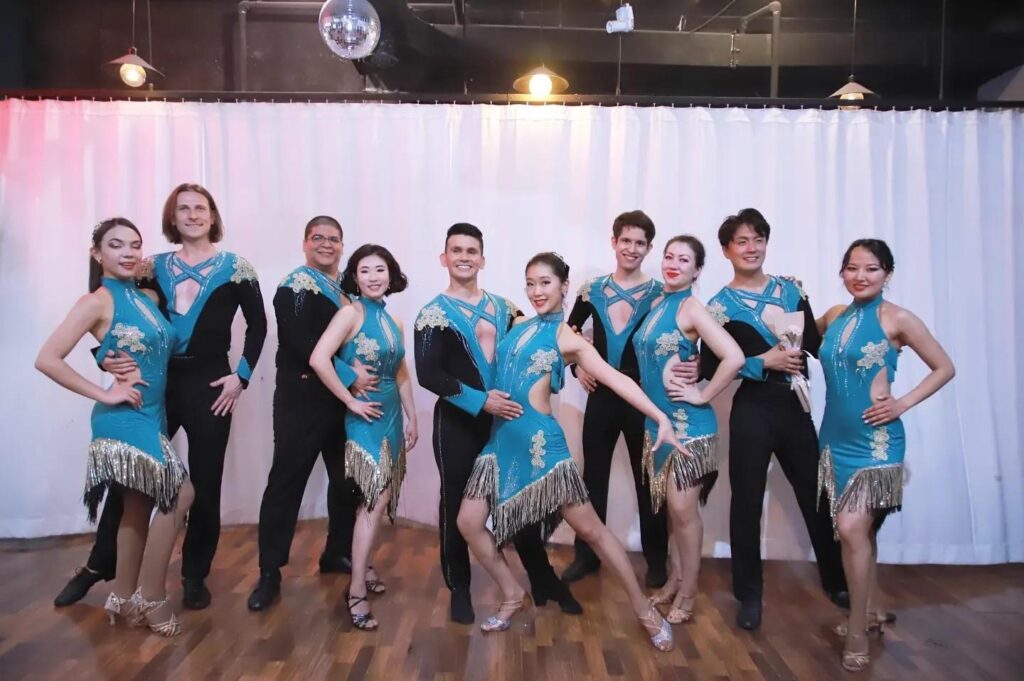
‘JDC Stars’ Performance Team. Source: Jonathan Dance Company (JDC)
What attracts South Koreans to pursue Latin Dance Forms?
In an exclusive interview with NOVAsia, Jhonathan & Jane, as well as two other dance students- Bae and Eunice- share their views on the growing interest for Latin dances. This article envelopes their distinct perspectives across diverse aspects to imbibe a deeper understanding of the catalysts in this emerging Latin wave in South Korea.
For Jane, Latin dance came as a blessing for her creative soul and soothed her melancholy. She discovered her true purpose and meaning in life by creative expression through dance. She reminisces, “At that phase in life…I was always questioning myself, ‘Is this really my life?…If I am going to live like this, then there is really no point to life at all. That was until I found Jhonathan, JDC and discovered Latin dances.’ ”
Bae is another South Korean student learning dance at JDC to gain some work life balance and relieve her job stress. “I used to feel very stressed from my work, and it’s hard not to think about it even after finishing work. But while I’m dancing, I don’t worry about anything but enjoy the pure joy. Dancing separates my real life and my work, and it makes me work longer. If I didn’t dance, I would have already quit my job”
Eunice, a South Korean dancer, has been learning Latin dances for 4 years as it makes her “feel like a beautiful woman” every time she dances. I personally resonate with Eunice’s feelings. My relationship with my body is now steadily transforming into one of acceptance and celebration. My perception of my curves, my skin, my hair; all characteristics that defined me once seemed ugly, detestable, and unworthy. Today, when I am on the dance floor, I feel like a beautiful painting, an art form that is chiselled and displayed with the elegant craftsmanship of my dance partner. It is an inexplicable momentary connection that we develop amidst our twirls and spins, brimming with passion; and as the music comes to a close…the charm dissipates, leaving behind a dreamlike memory.
Jhonathan concurs, that Latin dance could be a huge escape and cure to one of Korea’s biggest issues: depression. He reckons that it could be one of the major reasons why more and more Koreans are enrolling for Latin dance classes and going to dance socials – to experience happiness and be at peace with themselves. He said, “Several countries today including Korea are grappling with stress and depression…. That’s one of the reasons why I am a dance teacher, because it is my dream to give people happiness.”
Similarities in Latin & Korean Cultures?
Teaching dance in Korea over these years has inspired Jhonathan to notice interesting similarities between Latin & Korean cultures. Historically, he recounts how King Gasil of Gaya, invented the musical instrument ‘Gayageum (가야금)’ with the purpose of helping to unite people with music rather than words. This philosophy of brotherhood, community love, and happiness also form the core of Latin roots & culture. During the Colombian President Iván Duque Márquez’s visit to Korea, JDC presented him with a Gayageum performance by 5 artists, as a symbolic reminder of Korean and Latin American shared culture.
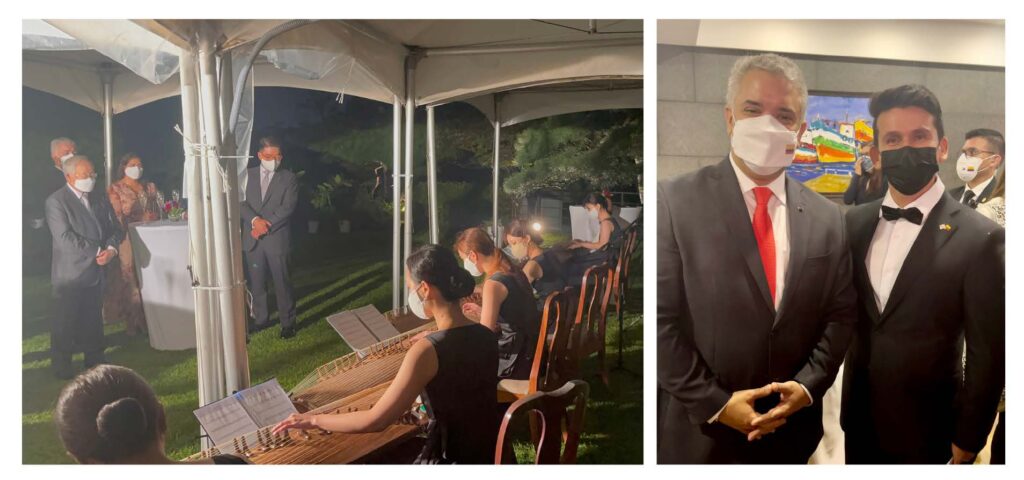
Left: Gayageum Performance; Right: President Márquez’ with Jhonathan [Source: Jonathan Dance Company (JDC)]
Lust for Perfection over Joy of Dancing?
In my experiences with social dancing with diverse partners in South Korea, I was intrigued to notice that a common thread that bound all my male leads was their overbearing motivation to showcase a plethora of tricks executed in its utmost perfection. Some even to the point of thrusting immense force in twisting and turning my body to achieve their desired dance move.
While dance socials have always been a non-competitive arena purely for enjoyment, socialising, and having a gala time, yet I could personally sense the spirit of one-upmanship emerging from aficionados of diverse dance schools. Missing a beat or making mistakes were often looked at with a frown or in self- inflicting guilt by some of my partners.
Jonathan and Jane ardently feel that there needs to be a change in this attitude towards learning Latin dances. The purpose of dance ought not to be for measurement of talent by comparison, it ought not to be about creating division by competition; dance must always be about unifying people. Improvement can always be a goal, but the obsessive lust for perfection kills the traditional spirit of Latin dances.
Hush Hush Baby: Acceptance in Society & The Nickname Culture
Jane recounts that her family and close friends were very accepting and supportive of her decision to pursue her passion. However, as parents, their concerns merely stemmed from a point of seeking stability and security in Jane’s career profile. “When my parents saw that I was into this art, they could see that I was going to become an artist, that I was eventually going to quit my job. They could not see the whole picture! So they were a little bit worried…But they always believed that I made good decisions in my life and knew myself well … Eventually now they are very proud of me.”
From a more sociological perspective, Jhonathan & Jane believe that Latin dance forms are still enjoyed in secrecy in South Korea due to lack of acceptance. I was also funnily surprised to notice that everybody used a nickname or a pseudonym at dance socials with a motive to hide their real identity. It almost felt like a Cinderella persona dancing the night away at a masquerade ball, and as the clock struck twelve, the magic dispels as all return to their mundane routine of living a completely different life.
Jonathan shares his concern over the nickname culture. “Latin dance is precious to me, it’s my whole life; I would like for people of South Korea to confidently say their name and introduce themselves as their real self and feel proud of dancing Latin dance forms.” Jane vehemently joins in saying, “I am very stubborn about teaching and pursuing Latin dance to change the impression of Korean society towards Latin dance. Some conservative Koreans don’t view it as appropriate, for example, if someone’s girlfriend is dancing with other men they don’t understand it, but dance is an art, it’s a hobby just like golf or painting. I wish for people to just view it as that and nothing more.”
The turmoil of inhibitions is also reflected in Eunice’s initial impression of Latin dances. “….Latin dances use a lot of waist and body wave movements which appear very sensual to me, hence initially I was not interested in pursuing this artform…it could be hard to conclude if (the rest of the) Korean society accepts Latin dance forms (because) still some Koreans see that couple dances could make the dancers vulnerable to their emotions. They even think having affairs easily occurs in dancing communities…. ”
However, her impression of nicknames is more in a positive light; for people to have an opportunity to feel excitement derived out of their nicknames. “….They would discover different personas of themselves that they want to be (but cannot aspire to do in their regular life) and it might be just for fun.”
Hope for the Future!
I dream of living amidst a society that respects and acknowledges Latin dance as an artform that is pursued and cherished worldwide – held in the same pedestal as other renowned dance forms like hip hop, contemporary, ballet, and more. As for my self perception, my bond with dancing Bachata and Salsa will continue to deepen like the crimson hue of a rose. Prosperity, fame, wealth, lovers, and dance partners may come and go, but the gift of this bodily expression of dance, this moment in a song, this rhythm and vibe, this memory on the dancefloor will forever and always be mine.

